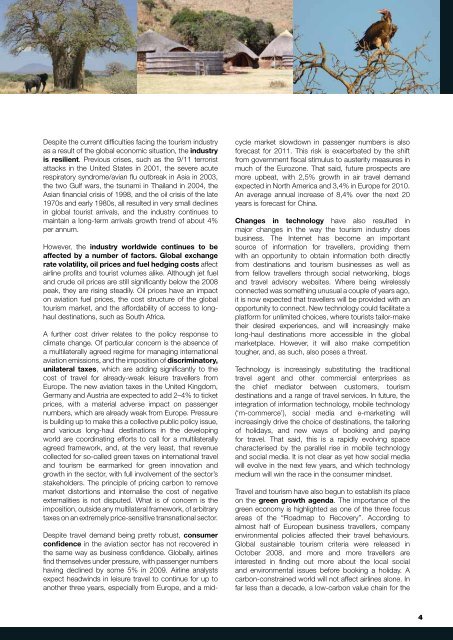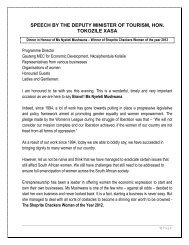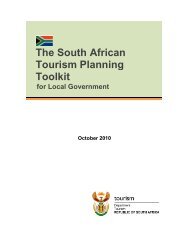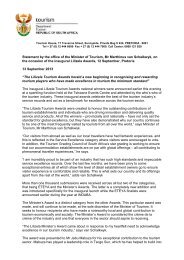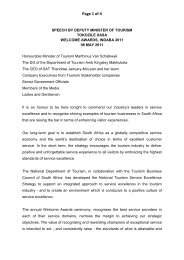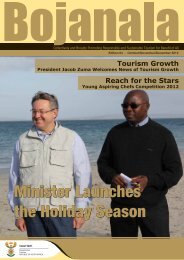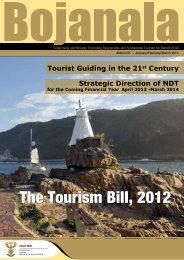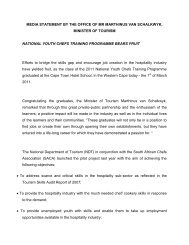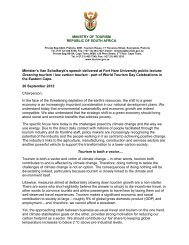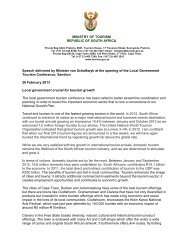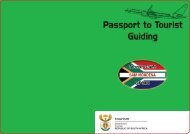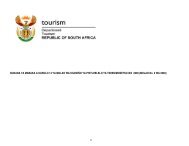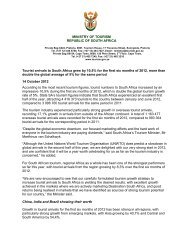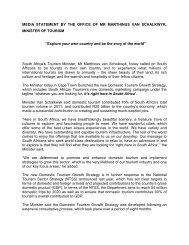National Tourism Sector Strategy - Department of Tourism
National Tourism Sector Strategy - Department of Tourism
National Tourism Sector Strategy - Department of Tourism
- No tags were found...
You also want an ePaper? Increase the reach of your titles
YUMPU automatically turns print PDFs into web optimized ePapers that Google loves.
Despite the current difficulties facing the tourism industryas a result <strong>of</strong> the global economic situation, the industryis resilient. Previous crises, such as the 9/11 terroristattacks in the United States in 2001, the severe acuterespiratory syndrome/avian flu outbreak in Asia in 2003,the two Gulf wars, the tsunami in Thailand in 2004, theAsian financial crisis <strong>of</strong> 1998, and the oil crisis <strong>of</strong> the late1970s and early 1980s, all resulted in very small declinesin global tourist arrivals, and the industry continues tomaintain a long-term arrivals growth trend <strong>of</strong> about 4%per annum.However, the industry worldwide continues to beaffected by a number <strong>of</strong> factors. Global exchangerate volatility, oil prices and fuel hedging costs affectairline pr<strong>of</strong>its and tourist volumes alike. Although jet fueland crude oil prices are still significantly below the 2008peak, they are rising steadily. Oil prices have an impacton aviation fuel prices, the cost structure <strong>of</strong> the globaltourism market, and the affordability <strong>of</strong> access to longhauldestinations, such as South Africa.A further cost driver relates to the policy response toclimate change. Of particular concern is the absence <strong>of</strong>a multilaterally agreed regime for managing internationalaviation emissions, and the imposition <strong>of</strong> discriminatory,unilateral taxes, which are adding significantly to thecost <strong>of</strong> travel for already-weak leisure travellers fromEurope. The new aviation taxes in the United Kingdom,Germany and Austria are expected to add 2–4% to ticketprices, with a material adverse impact on passengernumbers, which are already weak from Europe. Pressureis building up to make this a collective public policy issue,and various long-haul destinations in the developingworld are coordinating efforts to call for a multilaterallyagreed framework, and, at the very least, that revenuecollected for so-called green taxes on international traveland tourism be earmarked for green innovation andgrowth in the sector, with full involvement <strong>of</strong> the sector’sstakeholders. The principle <strong>of</strong> pricing carbon to removemarket distortions and internalise the cost <strong>of</strong> negativeexternalities is not disputed. What is <strong>of</strong> concern is theimposition, outside any multilateral framework, <strong>of</strong> arbitrarytaxes on an extremely price-sensitive transnational sector.Despite travel demand being pretty robust, consumerconfidence in the aviation sector has not recovered inthe same way as business confidence. Globally, airlinesfind themselves under pressure, with passenger numbershaving declined by some 5% in 2009. Airline analystsexpect headwinds in leisure travel to continue for up toanother three years, especially from Europe, and a midcyclemarket slowdown in passenger numbers is als<strong>of</strong>orecast for 2011. This risk is exacerbated by the shiftfrom government fiscal stimulus to austerity measures inmuch <strong>of</strong> the Eurozone. That said, future prospects aremore upbeat, with 2,5% growth in air travel demandexpected in North America and 3,4% in Europe for 2010.An average annual increase <strong>of</strong> 8,4% over the next 20years is forecast for China.Changes in technology have also resulted inmajor changes in the way the tourism industry doesbusiness. The Internet has become an importantsource <strong>of</strong> information for travellers, providing themwith an opportunity to obtain information both directlyfrom destinations and tourism businesses as well asfrom fellow travellers through social networking, blogsand travel advisory websites. Where being wirelesslyconnected was something unusual a couple <strong>of</strong> years ago,it is now expected that travellers will be provided with anopportunity to connect. New technology could facilitate aplatform for unlimited choices, where tourists tailor-maketheir desired experiences, and will increasingly makelong-haul destinations more accessible in the globalmarketplace. However, it will also make competitiontougher, and, as such, also poses a threat.Technology is increasingly substituting the traditionaltravel agent and other commercial enterprises asthe chief mediator between customers, tourismdestinations and a range <strong>of</strong> travel services. In future, theintegration <strong>of</strong> information technology, mobile technology(‘m-commerce’), social media and e-marketing willincreasingly drive the choice <strong>of</strong> destinations, the tailoring<strong>of</strong> holidays, and new ways <strong>of</strong> booking and payingfor travel. That said, this is a rapidly evolving spacecharacterised by the parallel rise in mobile technologyand social media. It is not clear as yet how social mediawill evolve in the next few years, and which technologymedium will win the race in the consumer mindset.Travel and tourism have also begun to establish its placeon the green growth agenda. The importance <strong>of</strong> thegreen economy is highlighted as one <strong>of</strong> the three focusareas <strong>of</strong> the “Roadmap to Recovery”. According toalmost half <strong>of</strong> European business travellers, companyenvironmental policies affected their travel behaviours.Global sustainable tourism criteria were released inOctober 2008, and more and more travellers areinterested in finding out more about the local socialand environmental issues before booking a holiday. Acarbon-constrained world will not affect airlines alone. Infar less than a decade, a low-carbon value chain for the4


